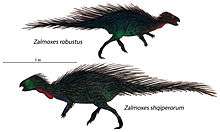1899 in paleontology
Paleontology or palaeontology is the study of prehistoric life forms on Earth through the examination of plant and animal fossils.[1] This includes the study of body fossils, tracks (ichnites), burrows, cast-off parts, fossilised feces (coprolites), palynomorphs and chemical residues. Because humans have encountered fossils for millennia, paleontology has a long history both before and after becoming formalized as a science. This article records significant discoveries and events related to paleontology that occurred or were published in the year 1899.
| |||
|---|---|---|---|
Archosauromorphs
Newly named birds
| Name | Novelty | Status | Authors | Age | Unit | Location | Notes | Images |
|---|---|---|---|---|---|---|---|---|
|
gen et sp nov |
Early Oligocene |
Deseado Formation |
described as a penguin now Aves incertae sedis |
|||||
Newly named dinosaurs
| Name | Novelty | Status | Authors | Age | Unit | Location | Notes | Images |
|---|---|---|---|---|---|---|---|---|
|
gen et sp nov |
Preoccupied. |
|
Maastrichtian |
Preoccupied by Othniel Charles Marsh, 1872. Renamed Telmatosaurus. |
||||
|
gen et sp nov |
reassigned |
Nopcsa |
Maastrichtian |
Reaasigned to Rhabdodon in 1915, than to Zalmoxes in 2003. |
 Illustrations of Z. robustus and Z. shqiperorum in scale | |||
References
- Gini-Newman, Garfield; Graham, Elizabeth (2001). Echoes from the past: world history to the 16th century. Toronto: McGraw-Hill Ryerson Ltd. ISBN 9780070887398. OCLC 46769716.
- Simpson, G.G. (1946). "Fossil penguins" (PDF). Bulletin of the American Museum of Natural History. 81.